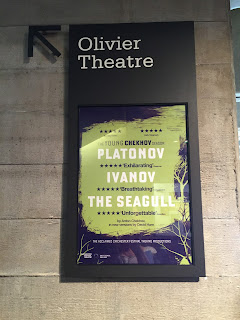It
often feels that Ivo van Hove’s
modern-dress production of Patrick
Marber’s adapation of Ibsen’s
classic has veered away from the original to such a degree that it is a brand
new play. But of course this is just a
misconception brought about because of this amazing director’s ability to turn
a classic (as he also did with the brilliant A View From The Bridge) into something fresh and new. He is aided and abetted by a paired down but
accurate new working of the text by the great Patrick Marber and Ruth
Wilson, an actress who has made her name synonymous with nuance.
Hedda Gabler
at The National is radical and so
gripping that even those of us who know the play well wonder what will happen
next. Ruth Wilson is extraordinary, but no change there. She was a shining star as Stella In A Streetcar Named Desire and Anna Christie both at The Donmar and continues to ensure that
The Affair on Sky Atlantic is a must
see. I also remember watching her play
Jane Eyre opposite Toby Stephen’s Rochester on television some years ago and thinking this is one
special actress.
And
now she is Hedda Gabler, a part that
she has apparently shied away from playing until now. Ivo
van Hove was one of the reasons for her volte-face and it is easy to see
why. He is the director of the moment
who manages to wiggle his way into the mindset of a playwright and squeeze
something extraordinary out of his/her text.
Unlike
Sheridan Smith’s more sympathetic
Hedda at The Old Vic, Ruth Wilson’s version is very difficult to
like. It could be all too easy to
categorise her as solely evil, if it weren’t for the fact that this young
actress is able to make her so much more.
Unencumbered by corsets and the strictures of Victorian society, this
modern Hedda’s “imprisonment” is of her own making. Holed up in a stark modern apartment on
return from honeymoon to the academic, Tesman (Kyle Soller) she is incapable of getting out and doing her “own
thing”. That she doesn’t love her new
husband is perfectly clear (her facial expressions and body language attest to this) but
this is not the elderly, domineering Tesman we’re used to seeing. Kyle
Soller plays him as intense but not without humour and the only demands he
seems to make are for them to become parents asap. Over her dead body! Sharing an apartment with him, let alone a
bed is obviously anathema to this bored, self-absorbed, at times cruel but
ultimately wretched young woman.
Hedda’s
raison d’etre is to destruct. Initially
it’s the buckets of flowers inhabiting the apartment that feel the brunt of her
frustration; the ones that aren’t left strewn across the floor are stapled to
the walls. Finally it’s herself, but not
until she has cruelly destroyed the beloved manuscript of her old flame, Lovborg
(Chukwudi Iwuji).
It’s
telling that there are no doors to Jan
Versweyveld’s high tec apartment;
the characters, come and go via the auditorium. Except for Berte, the maid (Eva Magyar) and Hedda herself, for they
have nowhere to go. There are visitors
but they’re not particularly welcome, despite her hatred for being alone. She is complicated this one! Mrs Elvsted (Sinead Matthews) does illicit something approaching
admiration. She has bravely left her
husband in order to be with the reformed character, Lovborg. If only Hedda had that much courage.
Apart
from the buckets of flowers, an old sofa and Hedda’s fathers’ pistols in a
glass case, the only major prop on stage is an upright piano at which Hedda is
slumped at the start of the play. Barefooted
and dressed in a silk, clingy slip, she tinkers on the keys and cuts a solitary
figure. Later, the strains of Joni
Mitchell’s Blue add to the melancholic atmosphere until, finally the
inevitable happens.
The
entire cast is strong, although I did have trouble hearing Kate Duchene’s Aunt Juliana at the beginning of the play. But Rafe
Spall as Judge Brack is especially fine.
The ultimate controlling male, he exerts an unsettling power over Hedda,
invading her space, goading her and even covering her with his can of tomato
juice.
There
are many more superlatives I could use but suffice it to say this Hedda Gabler packs a devastating punch
and is a definite must see.











